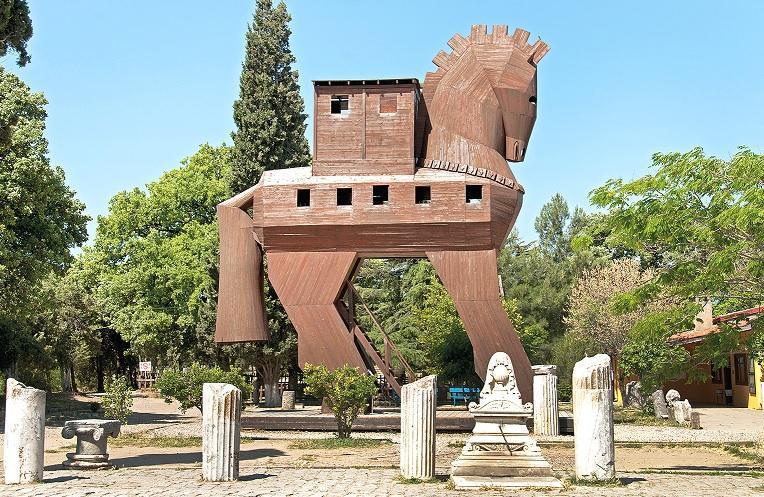Professor’s books serve young archaeologists
ÇANAKKALE

The books of German archaeologist Professor Manfred Osman Korfmann, who headed excavations in the ancient city of Troy between 1988 and 2005, were donated by his family after his death to the Çanakkale-Tübingen Troia Foundation’s library. Now, the books light the way for future archaeologists.
Born in 1942 in Cologne, Korfmann also took the Turkish name Osman, which he said he loved.
He studied at some universities in Germany and the United States and made his first field studies in South Africa, Swaziland and Mozambique.
In 1988, he became the head of archaeological excavations in the ancient city of Troy in the northwestern province of Çanakkale’s Tevfikiye village and worked there until his death in 2005. His name became known from his works there.
The German archaeologist also founded the Çanakkale-Tübingen Troia Foundation in 2004.
After his death, Korfmann’s family decided to donate his books to the foundation’s library, which is named for the famous archaeologist.
With their decision Professor Hans Jucker and Dr. Ines Jucker-Scherrer, with whom Korfmann worked, donated their books to the library, too.
Çanakkale Onsekiz Mart University (ÇOMÜ) Professor Manfred Osman Korfmann Library has 15,000 books and approximately 30,000 offprints and articles.
The library also lights the way for future archaeologists. Scientific publications in the library include archaeology and ancillary disciplines. The library also has publications on Troy and Troas archaeology, as well as publications on Anatolia, Georgia, the Balkans, Europe and general archaeology.
In addition, the library building hosts activities such as conferences, seminars, workshops and exhibitions.
Important library for new archaeologists
Enver Sadık Yılmaz, chairman of the Çanakkale-Tübingen Troia Foundation, told the state-run Anadolu Agency that the Troia Foundation was a project Korfmann wanted to realize before he died.
Stating that Korfmann wanted Troy to remain active after him, Yılmaz said, “He wanted Troy to be protected by the local people and his actions to be maintained. For this purpose, the foundation was established. Troy Foundation members are made up of carefully selected successful academics and businessmen. Before he died, he entrusted all his savings, printed articles and books to our foundation. We started to do a study on this subject. We searched for space for these valuable books. This place was used as a school connected to the Armenian Church during the Ottoman period but remained empty after the Armenians left Çanakkale. During the Republican period, it was used as a tobacco warehouse under the Monopoly Administration for a period, and then it was empty again.”
Yılmaz stated that the building, which was purchased by the municipality in 2006, was allocated to the Troy foundation upon request and that the restored building was converted into a library by getting financial support from local people and civil institutions.
The works in the library are precious, Yılmaz said.

“Korfmann was a lover of Troy; he lived 20-25 years for Troy. He always wanted to emphasize the importance of Troy,” Yılmaz said. “He was able to remove many finds in Troy for academic purposes but not for magazine. In Troy, where he cares very much, he carried out many important works. These books are also an important resource for new archaeologists and new scientists.”
Yılmaz said the foundation’s purpose was to protect Troy and the Troas region.
“Our youth also need this. Therefore, this library will surely provide them with great benefits for the future. As a matter of fact, we have a protocol with the university. In exchange for the technical support we receive from them, the books in our library are also in the catalogs of the university library. These books can reach larger, wider audiences. University students are constantly using our library. Twenty to 30 people work in our library a day,” he said.
















